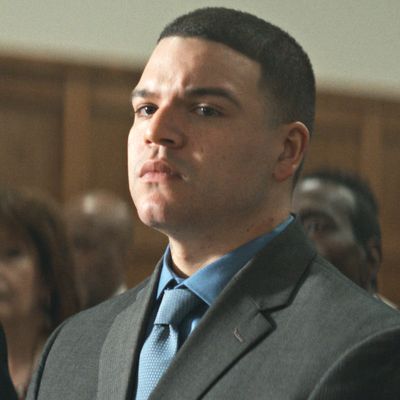
You know, this first season of American Sports Story has been a pleasant surprise for me. Will this end up on my year-end rankings for best TV shows of the year? Nah. I’m not sure I’d recommend it over Killer Inside, the 2020 documentary. And I’m still not sure it’s, like, necessary. But that’s true of a lot of true-crime shows! For what it is, the series has managed to get past some early speed bumps by barreling forward in its depiction of the tragedies at the heart of the story. The title of this finale is “Who Killed Aaron Hernandez?” and it’s to the show’s credit that it doesn’t grasp for a definitive answer to that question.
It’s clear that CTE played a major role, and I think the show has done a good job spotlighting the effects of the disorder without over- or underplaying it. In the opening scene of this finale, half an hour before Aaron’s death plays out, we see researchers from Boston University cutting open his brain, breathless at their discovery. As the expert later explains in a press conference, the brain damage to Aaron’s frontal lobes was severe, almost certainly affecting his decision-making and impulse control in recent years especially. He likely had ten years left before total impairment if he had lived.
It makes sense that this “subplot” gets more screen time in this episode than any previous one, as in real life, the story of Aaron’s CTE is told in retrospect. D.J., Terri, and Shayanna argue over letting the university examine the brain, but ultimately they’re all craving an answer to that titular question. Looking back, it seems so obvious — as D.J. points out, he always led with his head on the field, taking hit after hit for years. And as Aaron explained in his final conversation with Tanya (let out on compassionate release), his migraine problem wasn’t new; handling it in prison without consistent team-supplied medication was. But Bill Belichick has nothing in particular to offer when journalists ask about coaches hiding the effects of the disease. That’s for medical staff.
But prior to the last few scenes, the biggest narrative focus in this finale is Aaron’s second murder trial. This time he has a much stronger legal team, led by Jose Baez (Jose Pablo Cantillo), who calls himself “Juanie Cochran” — the nickname given to him by Geraldo Rivera when he led the successful Casey Anthony defense. The team also includes George Leontire (Gregory Porter Miller), a gay man himself.
For appearance’s sake, Aaron’s family should ideally be at the trial, but Shayanna is the only one who still shows up for him now. Both Terri and D.J. are still suffering from constant scrutiny, with D.J. totally unable to find a football job. Terri says she “just can’t,” but to Aaron, it’s yet another instance of his mom failing to come through for him. Angry after getting off the phone with her, he immediately instigates a fight with the guy who’s been taunting him about his basketball skills. It’s still the only way Aaron knows how to handle his emotions.
At the trial, Alexander Bradley, a.k.a. Sherrod, is the prosecution’s star witness. But Baez easily undermines his testimony about the Boston double murder by painting him as a violent criminal himself, citing his nicknames (like “Sherrod the Shooter”) and triggering a furious (but justified) outburst about what Aaron did to him. The prosecution’s next strategy is what Leontire calls a gay-panic defense: bringing in Chris as a witness, using his testimony to argue that the stress of staying in the closet led Aaron to kill. Thankfully, the motion in limine filed by Leontire is granted, so the gay rumors are left to percolate without any real proof or public testimony.
It’s worth noting that something like this actually did happen, even if Chris is a composite character. (Baez and Leontire spoke about it on Oxygen’s “Aaron Hernandez Uncovered” special.) But in the context of this depiction, it feels meta. Early on in the season, it felt like Aaron Hernandez actually was drawing a link between Hernandez’s queerness and his crimes, so having someone like Leontire come in to call it out is clarifying. The same goes for the scene that follows when Aaron looks to Leontire as a sort of queer elder and asks if someone abused him as a kid. “That’s not what makes people gay,” the man replies. It should be an obvious point, but the show has been a little wishy-washy about it, especially back in that episode with the actual flashback to Aaron’s molestation at the hands of his (fictionalized) uncle.
Aaron is found not guilty, but you get the sense that it might be too late for him to pull out of his tailspin, especially now that the rumors are out there. “Who Killed Aaron Hernandez?” doesn’t fully blame homophobic bullying for Aaron’s suicide, but it’s definitely the trigger that leads him to his final dark moments, purchasing K-2 after hearing that it will let him “see God.”
It makes sense that Aaron would turn back to religion, given what we saw of his friendship with Tim Tebow early in the series. Christianity was never going to be enough to fix Aaron, especially considering the emphasis on tamping down his feelings and forcing a heterosexual relationship. But for a time, it did allow him to feel more under control. His prison Bible study group reminds him of John 3:16, the citation Tebow inscribed on his eye black, and makes him think of what heaven means to him: “finally being free.”
When Aaron looks into the mirror and hallucinates his father, it almost feels like he’s already dead, glimpsing heaven for the first time. This version of Dennis says all the things Aaron always wanted to hear: that he loves him, that he’s proud of him, that he just wanted to protect him from the world. But that Dennis is not actually here, and Aaron knows that when he scrawls John 3:16 on his forehead and on the wall of his cell. True freedom is not available to Aaron, not now and maybe not ever, and this little taste of it feels too good to let go.
Recent episodes of Aaron Hernandez have excelled by stepping outside Aaron’s point of view, but this finale immerses us back in his state of mind, forcing us to experience his harrowing final days and really understand what his paranoia and insecurity felt like. Only in the last few minutes do we feel his absence, seeing everyone else left behind with their fears and regrets. Shayanna watches a group of young boys playing football, wondering if one of them could go down the same path as the man she still loves but never had the chance to marry. Everyone is a product of their influences, of course, and football is not inherently evil. But when something like this happens, it’s impossible not to reflect and see the warning signs wherever you look. If only they felt real at the time.
The End Zone
• The episode includes a few short scenes showing The Kirk and Callahan Show, whose hosts referred to Aaron as “the next O.J.” and made fun of his apparent queerness after hearing the rumor from journalist Michele McPhee. Many at the time argued about whether this constituted an outing.
• There’s an interesting moment when Aaron seems a little unsettled by Shay’s words about hoping he can return to his old life one day. The Aaron of the past wasn’t truly happy or comfortable, and he was covering up a huge part of himself, so I imagine it’s hard to idealize it as much as Shay does.
• I can’t tell what Chris is feeling when he learns he won’t be testifying, which reminds me that his perspective has never felt totally clear. I would think a big part of him feels relieved that he doesn’t have to out his ex and himself, right?
• Thanks for reading!


